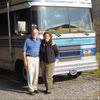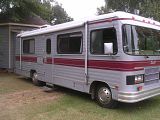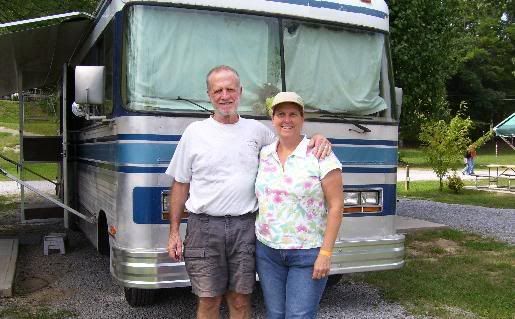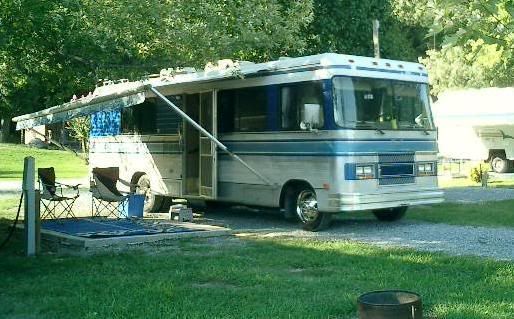Go to...  | Start A New Topic  | Search  | Notify  | Tools  | Reply To This Topic  |  |
 6/12 6/12Formally known as "Humbojb"  |
Tere and I want to put a transmission temperature gauge in our '85 Regal 454. What is the best location for the sensor? If anyone has experience with the best manufacturer/supplier of the parts, would appreciate it. I though there was a post on this subject earlier, but I did a search and could not find it. We'll probably put a tach on at the same time. Jim
| |||||||||||
|
In-the-line, before the cooler(s), will give you peak temps of just-worked fluids. You'll see the greatest temp swings as you go up-n-down hills....provides some entertainment value. Pan mounted sensor gives you a more stable reading of greatest volume at the ready-to-work temp. You'll need a bung to mount sensor if you don't have drain plug - easy enough to do by drilling and mounting with compression nut, but you'll need to drop pan. Some mount sensor in pressure test port on left side of case, but I don't know what exactly that location tells you.....Installations are relatively easy, and lots of styles & options available at places like Jegs & Summitt Racing. If you're thinking 'bout tach, also think about adding vacuum gauge at same time...helps keep your foot out of the Qjet secondaries and gets you a tad better mileage. | ||||
|
| First Month Member |
Here is a quote from the Orange ($8.95) GM manual: -------------------------------------------------------------------------------------- "OIL TEMPERATURE MEASURED AT CONVERTER OUTLET TO COOLER. 300F is the maximum temperature. (Workhorse says 350F). This is the normal place to install a temperature gauge or signal. The temperature in this location will vary significantly with each vehicle start-up or hill. If the temperature reaches 300F (350F), reduce throttle. To lower the transmission temperature with the transmission in NEUTRAL, run the engine at 1,200 RPM for 2-3 minutes to cool the oil. Do not allow the converter outlet temperature to exceed 300F (350F). Keep a close check to prevent the engine cooling system from overheating. 300F would be typical of rocking the vehicle in mud, snow, or sand, or a transmission in stall (full throttle, no vehicle movement). When the transmission is in stall, the transmission will develop heat at a rate of one degree per second of stall." __________________________________________________ My take on this: A converter outlet reading should give the first indication of heat increase. It also lets you know if you are near maximum fluid temp of 300 (or 350 in Workhorse manual). Another reason I like converter out temp is it gives you not only info to save your tranny, but it also tells you how much heat your are putting into your radiator, thereby allowing you to perhaps avoid an engine overheat by shutting off dash air, switching on an electric fan, shifting down, activating the converter water spray, backing off the throttle, or whatever else you do. Having a pan temp reading allows you to be sure you don't exceed max pan temp of 285F for the TH400 and lets you know if your cooler is big enough for the hill you just climbed. Once you have climbed your biggest hill on your hottest day without an overtemp event, you can forget about watching the tranny temp. My trans temp gauge has two senders, one in a tee between the converter outlet and the coolers, and one in the pan. I watch the converter outlet temp as I climb, maneuver back and forth in tough boondock spots, or drive in stop and go traffic, and occasionally check the pan temp to see if my coolers are big enough. . 84 30T PeeThirty-Something, 502 powered | |||
|
Official Barth Junkie |
Bill h: Just the man I need to ask. Since you have both sensors (I will soon) how does your line temp compare to your pan temp in steady cruise? I have only line gauge now and I've seen 300 (or a little more) with the toad up a hill. I backed down a little and turned on the electric fan with my manual switch and it comes down under 300 OK but I'd still like to know the "average" temp, ie pan temp. I'm seeing about 250 on the line gauge steady state and I'm assuming pan is maybe 220 or so but I'll know soon. I have one cooler now, may do another if needed. 9708-M0037-37MM-01 "98" Monarch 37 Spartan MM, 6 spd Allison Cummins 8.3 325+ hp | |||
|
| First Month Member |
I really don't remember exactly, but things are pretty cool in steady cruise. It's long hot hills that get us. The long climb from Quartzsite to Prescott takes us from 800-something to 6100 ft and slowly gets things hot. Last August, the B&M 70266 (20,000 BTU)was inadequate for the 502 and the heavy 4WD toad at over 100 degrees for mile after mile of climbing. A Long 4739 (45,000 BTU) was also inadequate I have since added a B&M 70274 (29,200 BTU,made by Long) so in a coupla days we will see how the 70274 and the 4739 work together. I believe 74,200 BTU should cool things a little better than before. The 502 is a torque monster and our toad is heavy. The poor torque converter is in the middle, and has to do a lot of work. Other Barthers might not have as extreme needs as we do. . 84 30T PeeThirty-Something, 502 powered | |||
|
Official Barth Junkie |
Thanks Bill. I have a cooler now but I have no idea the rating. It's about 8" x 14" with about 6 tubes (I'd go out and look but I'm not at home.) It was originally installed in the wrong line, since corrected, but I'm going to get a pan sender so I'll know how well it's working. Just another thing on the list! 9708-M0037-37MM-01 "98" Monarch 37 Spartan MM, 6 spd Allison Cummins 8.3 325+ hp | |||
|
 1/18 1/18 |
Jim , i too am going to put trans temp gauge in . i saved this , take a look at this discussion . http://barthmobile.com/eve/for...411015913#9411015913 Bob Year:: 1986 Model:: Barth Regal Length:: 25 ft Engine:: New Chevy 454 HO Chassis:: P-30 Data Tag Number:: 8606 3339 25FP2 | |||
|
 |
Where would be the optimum location for a cooler? One that will affect on engine cooling the least. I feel like I'm babbling. Tommy A single conversation with a wise man is better than ten years of study. "When injustice becomes law, resistance becomes a duty." 8408-3125-28FP3 1985 28' Regal 454 Chevrolet P32 Chassis | |||
|
| First Month Member |
Optimum and that which effects the engine cooling the least are two different things. Optimum is a balance of compromises, depending on several things. If your cooling system is good, and can handle the extra load, having a tranny cooler in front of the radiator works well. This can be improved if the dash air is removed. Removing the condenser lets the radiator do its job more efficiently by removing a heat source and allowing better air flow. An electric fan that can be turned on for low speed, high heat, high load conditions can help, too. Things like low speed steep climbing, stop and go traffic, maneuvering back and forth into difficult sites, etc. My trans coolers are in front of the radiator, and my engine temp always stays good. The US Radiator Desert Cooler radiator I use is capable of the extra heat load. You will also get different inputs on flow priority. GM used to recommend running the fluid through the external cooler before the radiator heat exchanger. The later (green) GM MH manual says to run it through the radiator first. I have seen makers of coolers rec either routing. Some folks will say not to use the radiator heat exchanger at all. This removes the heat load that the heat exchanger puts directly into the coolant. The best way to avoiding extra hot air heat loading on the radiator is to have the cooler located out of the radiator air stream. This would require a fan for low speed operation, and (depending on location) a ram air duct for road speeds to avoid running the fan all the time. I did this on an earlier MH that had a much larger grill than Barth has. I provided an outlet behind the cooler so its hot air flow would not go through the radiator. If I had engine heat problems, I would look at a grill underneath one or both headlight assemblies for the trans coolers. Probably both, for symmetry. . 84 30T PeeThirty-Something, 502 powered | |||
|
 |
bill thanks, I appreciate you replying to my question. Tommy A single conversation with a wise man is better than ten years of study. "When injustice becomes law, resistance becomes a duty." 8408-3125-28FP3 1985 28' Regal 454 Chevrolet P32 Chassis | |||
|
| First Month Member |
The 4739 and the 70274 mentioned in my June 12 post proved to be inadequate. I have since added another 4739, so now have two 4739s and a 70274, for a total BTU capacity of 119,200 BTUs. I hope this is adequate, since I am flat out of room behind the grill. . 84 30T PeeThirty-Something, 502 powered | |||
|
 6/17 6/17 |
Another trick when engine temp starts to climb is to turn the dash heat on. Your heater core becomes an auxiliary radiator. We used this going over the Rockies and it worked immediately. R.P.Muise 1994 Breakaway/Cummins 5.9/Allison transmission/Spartan Chassis | |||
|
| First Month Member |
Doesn't seem to help trans temps. . 84 30T PeeThirty-Something, 502 powered | |||
|
| Powered by Social Strata |
| Please Wait. Your request is being processed... |
|
This website is dedicated to the Barth Custom Coach, their owners and those who admire this American made, quality crafted, motor coach.
We are committed to the history, preservation and restoration of the Barth Custom Coach.
We are committed to the history, preservation and restoration of the Barth Custom Coach.



